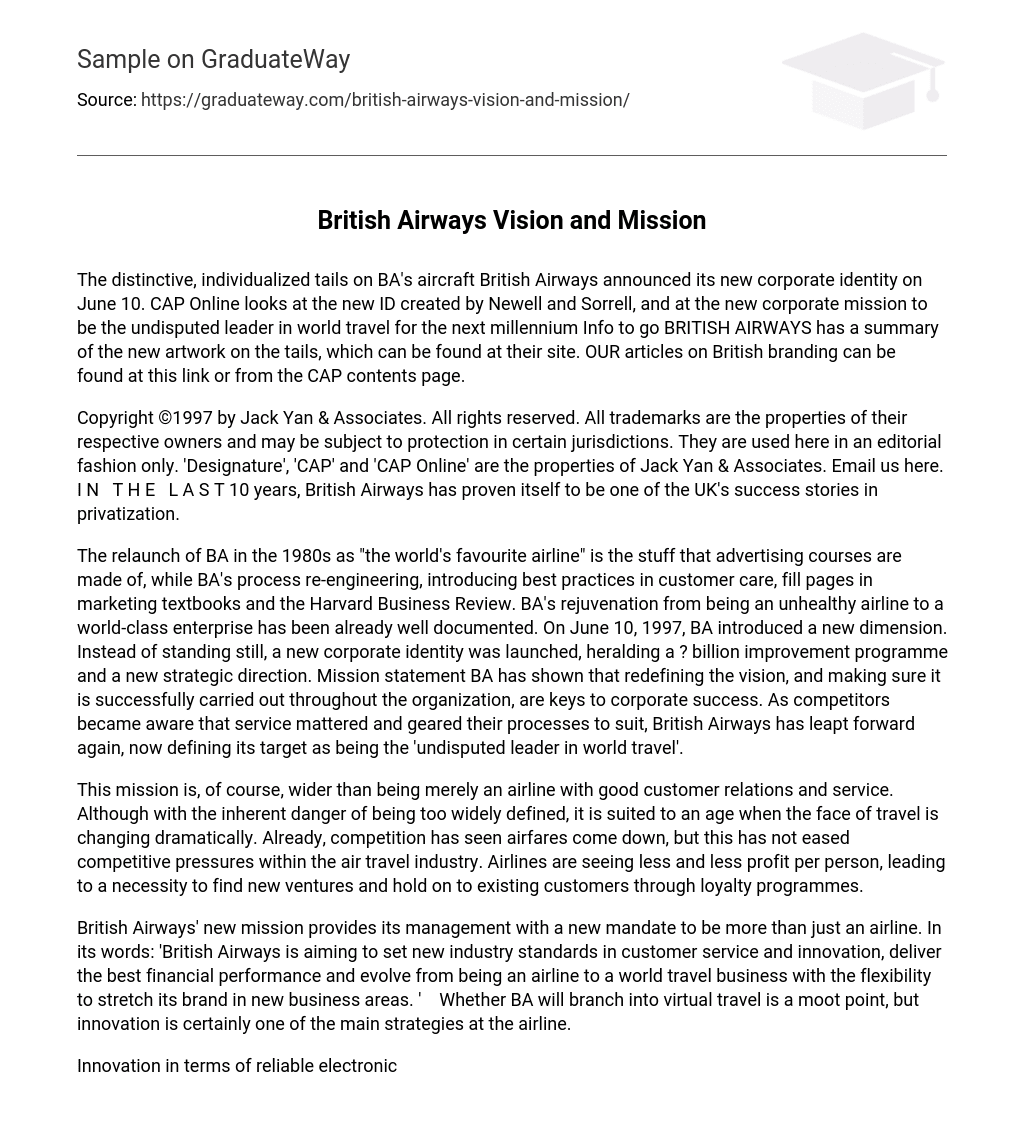The distinctive, individualized tails on BA’s aircraft British Airways announced its new corporate identity on June 10. CAP Online looks at the new ID created by Newell and Sorrell, and at the new corporate mission to be the undisputed leader in world travel for the next millennium Info to go BRITISH AIRWAYS has a summary of the new artwork on the tails, which can be found at their site. OUR articles on British branding can be found at this link or from the CAP contents page.
Copyright ©1997 by Jack Yan & Associates. All rights reserved. All trademarks are the properties of their respective owners and may be subject to protection in certain jurisdictions. They are used here in an editorial fashion only. ‘Designature’, ‘CAP’ and ‘CAP Online’ are the properties of Jack Yan & Associates. Email us here. I N T H E L A S T 10 years, British Airways has proven itself to be one of the UK’s success stories in privatization.
The relaunch of BA in the 1980s as “the world’s favourite airline” is the stuff that advertising courses are made of, while BA’s process re-engineering, introducing best practices in customer care, fill pages in marketing textbooks and the Harvard Business Review. BA’s rejuvenation from being an unhealthy airline to a world-class enterprise has been already well documented. On June 10, 1997, BA introduced a new dimension. Instead of standing still, a new corporate identity was launched, heralding a ? billion improvement programme and a new strategic direction. Mission statement BA has shown that redefining the vision, and making sure it is successfully carried out throughout the organization, are keys to corporate success. As competitors became aware that service mattered and geared their processes to suit, British Airways has leapt forward again, now defining its target as being the ‘undisputed leader in world travel’.
This mission is, of course, wider than being merely an airline with good customer relations and service. Although with the inherent danger of being too widely defined, it is suited to an age when the face of travel is changing dramatically. Already, competition has seen airfares come down, but this has not eased competitive pressures within the air travel industry. Airlines are seeing less and less profit per person, leading to a necessity to find new ventures and hold on to existing customers through loyalty programmes.
British Airways’ new mission provides its management with a new mandate to be more than just an airline. In its words: ‘British Airways is aiming to set new industry standards in customer service and innovation, deliver the best financial performance and evolve from being an airline to a world travel business with the flexibility to stretch its brand in new business areas. ‘ Whether BA will branch into virtual travel is a moot point, but innovation is certainly one of the main strategies at the airline.
Innovation in terms of reliable electronic bookings, new schedules, more comfortable seats, new customer loyalty programmes and new services in lounges may be more realistic expectations in the immediate term. Short-term goals will include diversification. This was hinted at by British Airways’ CEO Bob Ayling: ‘We cannot afford to stand still. We have to maintain our lead through even greater innovation, so we offer outstanding products and a quality of service that people will alter their travel plans to enjoy. From an investor relations’ standpoint, the new mission presents a new confidence within BA that can only be beneficial. Further, it is the signal that BA’s business efficiency programme from last September and its recently conducted research about the future of world travel were not one-offs, but part of a greater vision for the new millennium. The new BA identity





